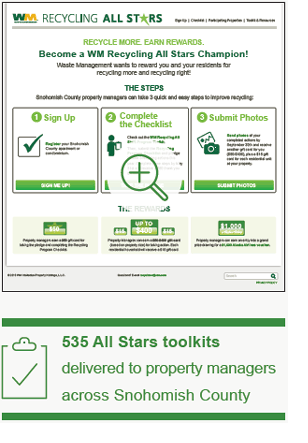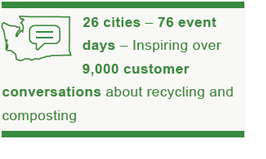

|
COMMUNITY OUTREACH
All Stars
|

Beginning in 2012, Waste Management and Snohomish County Solid
Waste started working together to create a multifamily program that
empowered property managers (PM) to improve recycling infrastructure
and programs on their properties to increase overall recycling diversion
rates, while also minimizing recycling contamination levels.
In phases one and two, executed in 2013 and 2014, Waste Management
and Snohomish County researched and developed the "Waste
Management Recycling All Stars" program. This new multifamily program
includes both a PM recycling toolkit and an annual recognition program,
which combines PM recycling outreach and education actions with rewards
and community recognition. Phase three, launching the program pilot,
ultimately sought to assess whether equipping property managers with the
information and resources provided in the toolkit, combined with financial
and recognition-based incentives, would in fact enable and motivate them
to address and improve their onsite recycling programs.
Toolkits were delivered to all property managers across Snohomish
County. The toolkits were provided both as a printed guide and an
interactive website PMs could access to easily participate and utilize
program resources. Toolkits provided information on participating in
the All Stars program and detailed program rewards and recognition.
It also provided in depth information on how to evaluate their recycling
infrastructure, educate and motivate residents while tracking and
sustaining their recycling program. Just over 500 toolkits were delivered
and program participation and completion was tracked throughout the year. Final program evaluation, which included participant
and non-participant surveys, yielded interesting results. The toolkits and resources were very popular among program
participants, PMs found that access to education materials and resources provided in the toolkit very helpful. Yet, of the 535
toolkits distributed only 35 resulted in participation from 37 properties, post program analysis uncovered that financial and
recognition-based incentives were only minimally compelling, though PMs liked having financial incentives to share with residents.
Waste Management and Snohomish County added a technical assistance component to this program to help property managers
improve recycling at their properties because inadequate service levels were identified as one of the biggest barriers to effective
multifamily recycling. Waste Management staff identified and then worked with properties to "right size" them.

|
Recycling Information Station
|

In 2015, Waste Management engaged event attendees from across
the Puget Sound through our signature Waste Management Recycling
Information Station. The station hosts a multitude of resources on recycling
and composting. These include interactive displays that serve as a module
for teaching recycling and composting in a fun way, informative and
comprehensive handouts that clearly display and educate on the nuances
of recycling and composting and token giveaways made from recycled
materials to bolster the messaging of renewal and reuse.
Each year, the Recycling Information Station can be found at a variety of
events throughout the Puget Sound Region, such as Algona Days, Enumclaw Street Fair, Gold Bar Gold Dust Days, Mill Creek
Festival, Pacific Days, Sultan Summer Shindig, Tour de Terrace and White Center Jubilee Days.
At the Recycling Information Station, Waste Management staff encouraged residents and business owners to ask hot topic
recycling and composting questions, provided tips and tricks to encourage positive recycling behavior at home and at work and
supplied information on where to take hard to recycle items, such as block foam. Community events provide a unique opportunity
for customers to ask questions directly to trained staff, and gather the latest tools and resources. By meeting customers where
they are, Waste Management's education booth continually increases the accessibility of recycling information to complement
ongoing community-based outreach.

|
|
|
|
|


